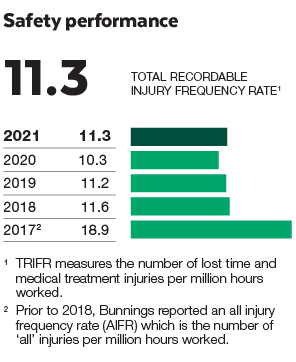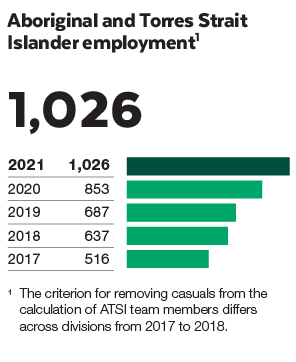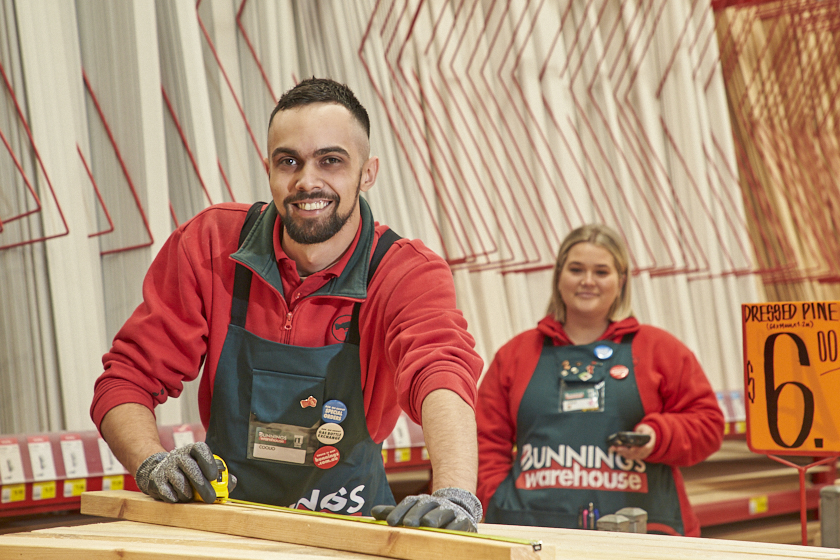Bunnings - People
Team members are the most important part of the Bunnings business and their safety and wellbeing remain the highest priority. Bunnings’ focus is on preventing work-related injuries, illnesses and incidents in the workplace as well as protecting and promoting the wellbeing of the team. At the end of financial year, Bunnings employed approximately 50,000 team members across the business.
In the financial year, there was a 9.7 per cent increase in the TRIFR and the number of team member injuries recorded increased by 24.6 per cent.
These results are attributed to sharp changes in Bunnings’ operational model and increased demand for products. This resulted in recruitment of new team members, higher levels of activity and performing operational tasks that were different from their regular roles. This involved increased manual handling to move higher volumes of stock and facilitate customer order collections from stores, including large and bulky products, during periods of restricted trading, primarily during the Victorian and New Zealand COVID-19 lockdowns.
Removing the impact of these unique COVID-19 related activities, Bunnings' safety measurements tracked well throughout the year.
To mitigate team member injuries in the future, Bunnings has implemented solutions, including moving high-volume stock to the front of the store, team task rotation, extra breaks to provide rest and recovery from additional manual handling, reminders on safe lifting techniques, security guards to assist with challenging situations, designated areas of the car park for drive and collect, and proactive counselling calls for leaders.
Notwithstanding the challenges that COVID-19 presented during the year, Bunnings’ safety and wellness agenda continued to be driven around reducing risks and preventing injuries, improving wellbeing and helping team members with injuries get back to life and work.
During the year, the business focused on evolving the safety strategy around several key areas.
Bunnings continued the use of cross-functional teams and piloted learning teams to investigate safety incidents and drive robust remedial actions.
The learning teams include team members who regularly conduct the work, along with subject matter experts. Their role is to harness knowledge and feedback from the team on normal business practices, such as loading and unloading timber, to determine what works well and what improvements are required to mitigate risk and enhance work processes.
Functional safety and wellness plans were implemented, outlining actions to reduce injury risk and increase wellbeing for each team across the business. New safety leadership training was also piloted, with the aim to launch this more broadly in the next financial year.
Quarterly safety and wellness campaigns were conducted across all sites. For example, engaging and themed activities focused on early intervention and the importance of ensuring the best care immediately following an injury or illness.
The rollout of new technology counterbalance forklifts neared completion during the year and an artificial intelligence pedestrian detection system for maintaining exclusion zones around forklifts was piloted. Other improvements during the year included the installation of fail safes on gates and pelmets above automatic opening doors.
A lead indicator safety dashboard was launched for all sites. Measurement of each site’s leadership, engagement and effort toward safety for each quarterly safety and wellness campaign commenced. Benchmarking across other leading organisations and industry was conducted to identify which indicators are best to measure risk and understand safety performance. Work to pilot, test and report on these measures will begin in the next financial year.
With ongoing challenges presented due to COVID-19, increased support was provided for the Bunnings team, including an assistance program to proactively conduct check-in calls with leaders. Four online learning modules were launched to further develop leaders’ capability to support the team’s mental health, with a new team mental wellbeing course piloted during the year.
Mental health resources continued to be shared on the online Stronger Together Workplace group to support team members during the challenges of COVID-19. Materials included educational videos in partnership with Nutrition Australia focused on yoga, mindfulness, nutrition, Wellbeing Week and World Mental Health Day. During the year, Bunnings became a founding member of the newly launched Corporate Mental Health Alliance Australia, established to share best practice in corporate mental health and wellbeing.
Bunnings continued to develop and coach team members in new ways when face-to-face learning wasn’t possible due to COVID-19 restrictions, turning many learning and development offerings into virtual, on-demand programs. Bunnings recruited and onboarded around 10,000 new team members, with many joining while in lockdown. When restrictions eased, all new team members were taken through face-to-face training to embed their understanding of Bunnings' culture and strategy.
In response to some of the challenging situations sometimes faced by team members in stores, Bunnings launched a campaign to shift thinking about challenging behaviour and empower team members in dealing with these situations. This is an ongoing program and at launch included a new policy, online training course for all team members and a leader toolkit.
Bunnings recognises how important flexible working is for team members and the contribution it makes to job satisfaction. During the year, Bunnings updated its Flexible Working Framework to support team members in managing individual work and personal commitments, while ensuring the operational requirements of roles are met.
Bunnings is committed to creating a safe and supportive work environment for all team members regardless of age, ability, gender identity, sexual orientation, race, ethnicity or background. Encouraging Indigenous people to obtain fulfilling jobs with leadership development and career progression is a priority for Bunnings. In the financial year, 2.3 per cent of Bunnings team members in Australia self-identified as Aboriginal and Torres Strait Islanders.


GRI 103-1, GRI 103-2, GRI 103-3, GRI 403-1, GRI 403-2, GRI 403-3, GRI 403-4, GRI 403-5, GRI 403-6, GRI 403-7

.jpg?sfvrsn=4ab613bb_1)